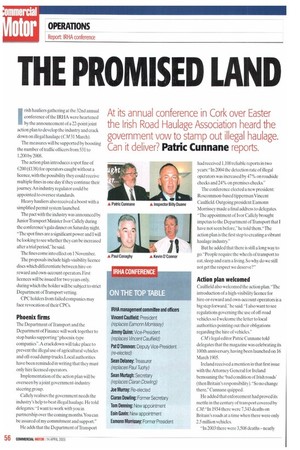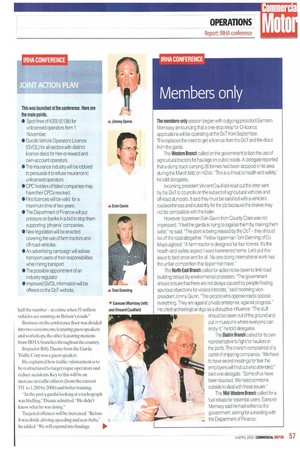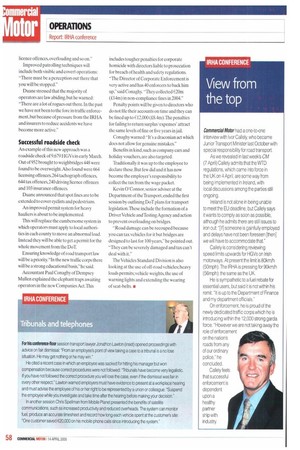THE PROMISED LAND
Page 58

Page 59

Page 60

If you've noticed an error in this article please click here to report it so we can fix it.
At its annual conference in Cork over Easter the Irish Road Haulage Association heard the government vow to stamp out illegal haulage.
Can it deliver? Patric Cunnane reports.
Irish hauliers gathering at the 32nd annual conference of the IRHA were heartened by the announcement of a 22-point joint action plan to develop the industry and crack down on illegal haulage (CM 31 March).
The measures will be supported by boosting the number of traffic officers from 531 to 1,200 by 2008.
The action plan introduces a spot fine of €200 (£138) for operators caught without a licence, with the possibility they could receive multiple fines in one day if they continue their journey. An industry regulator could be appointed to oversee standards.
Heavy hauliers also received a boost with a simplified permit system launched.
The pact with the industry was announced by Junior Transport Minister Ivor Callely during the conference's gala dinner on Saturday night. "The spot fines are a significant power and! will be looking to see whether they can be increased after a trial period," he said.
The fines come into effect on 1 November.
The proposals include high-visibility licence discs which differentiate between hire-orreward and own-account operators First licences will be issued for two years only, during which the holder will be subject to strict Department of Transport vetting.
CPC holders from failed companies may face revocation of their CPCs.
Phoenix firms
The Department of Transport and the Department of Finance will work together to stop banks supporting "phoenix-type companies".A crackdown will take place to prevent the illegal use of agricultural vehicles and off-road dump trucks. Local authorities have been reminded in writing that they must only hire licensed operators.
Implementation of the action plan will be overseen by a joint government-industry steering group.
Callely realises the government needs the industry's help to beat illegal haulage. He told delegates: want to work with you in partnership over the coming months. You can be assured of my commitment and support."
He adds that the Department of Thansport had received 1,100 reliable reports in two years:"In 2004 the detection rate of illegal operators was increased by 47% on roadside checks and 24% on premises checks."
The conference elected a new president: Roscommon-based tipperman Vincent Caulfield. Outgoing president Eamonn Morrissey made a final address to delegates. "The appointment of Ivor Callely brought impetus to the Department of Transport that! have not seen before," he told them. "The action plan is the first step to creating a vibrant haulage industry."
But he added that there is still a long way to go. "People require the wheels of transport to eat, sleep and earn a living. So why do we still not get the respect we deserve?"
Action plan welcomed
Caulfield also welcomed the action plan. "The introduction of a high-visibility licence for hire-or-reward and own-account operators is a big step forward." he said."I also want to see regulations governing the use of off-road vehicles so! welcome the letter to local authorities pointing out their obligations regarding the hire of vehicles."
CM'S legal editor Patric Cunnane told delegates that the magazine was celebrating its 100th anniversary, having been launched on 16 March 1905.
Ireland received a mention in that first issue with the Attorney General for Ireland bemoaning the tad condition of Irish roads' (then Britain's responsibility). "So no change there," Cunnane quipped.
He added that enforcement had proved its mettle in the century of transport covered by CM: "in 1934 there were 7,343 deaths on Britain's roads at a time when there were only 2.5 million vehicles.
"In 2003 there were 3,508 deaths —nearly half the number at a time when 31 million and Vincent Caulfield vehicles are running on Britain's roads."
Business on the conference floor was divided into two sessions; one featuring guest speakers and workshops, the other featuring motions from IRHA branches throughout the country.
Inspector Billy Duane from the Garda Traffic Corp was a guest speaker.
He explained how traffic P nforcement is to be restructured to target rogue operators and reduce accidents. Key to this will be an increase in traffic officers (from the current 53110 1.200 by 2008) and better training.
"In the past a gardai looking at a tachograph was bluffing," Duane admitted.-He didn't know what he was doing."
Targeted offences will be increased. "Before it was drink-driving, speeding and scat-belts," $1.,
he added. "We will expand into haulage 11111' licence offences, overloading and so on."
Improved patrolling techniques will include both visible and covert operations: "There must be a perception out there that you will be stopped."
Duane stressed that the majority of operators are law abiding,but he warned: "There are a lot of rogues out there. In the past we have not been to the fore in traffic enforcement,but because of pressure from the IRHA and insurers to reduce accidents we have become more active."
Successful roadside check
An example of this new approach was a roadside check of 9,679 HGVs in early March. Out of 952 brought to weighbridges 448 were found to be overweight.Also found were 664 licensing offences. 264 tachograph offences, 644 tax offences, 240 driving licence offences and 103 insurance offences.
Duane announced that spot fines are to be extended to cover cyclists and pedestrians.
An improved permit system for heavy hauliers is about to be implemented.
This will replace the cumbersome system in which operators must apply to local authorities in each county to move an abnormal load. Instead they will be able to get a permit for the whole movement from the DoT Ensuring knowledge of road transport law will be a priority." In the new traffic corps there will be a strong educational basis." he said.
Accountant Paul Conaghy of Dempsey Mullen explained the elephant traps awaiting operators in the new Companies Act. This includes tougher penalties for corporate homicide with directors liable to prosecution for breach of health and safety regulations. "The Director of Corporate Enforcement is very active and has 40 enforcers to back him up." saidConaghy. "They collected €20m (£14m) in non-compliance fines in 2004."
Penalty points will be given to directors who do not file their accounts on time and they can be fined up to €12,000 (18.4m).The penalties for failing to return surplus 'expenses' attract the sarne levels of fine or five years in jail.
Conaghy warned: "It's a draconian act which does not allow for genuine mistakes."
Benefits in kind, such as company cars and holiday vouchers, are also targeted.
Traditionally it was up to the employee to declare these. But few did and it has now become the employer's responsibility to collect the tax from the wage packet.
Kevin O'Connor,senior adviser at the Department of the Transport, ended the first session by outlining DoT plans for transport legislation.These include the formation of a Driver Vehicle and Testing Agency and action to prevent overloading on bridges.
-Road damage can be recouped because you can tax vehicles for it but bridges are designed to last for 100 years," he pointed out. "They can be severely damaged and tax can't deal with it."
The Vehicles Standard Division is also looking at the use of off-road vehicles; heavy loads permits; vehicle weights. the use of warning lights and extending the wearing of seat-belts. •










































































































































































































